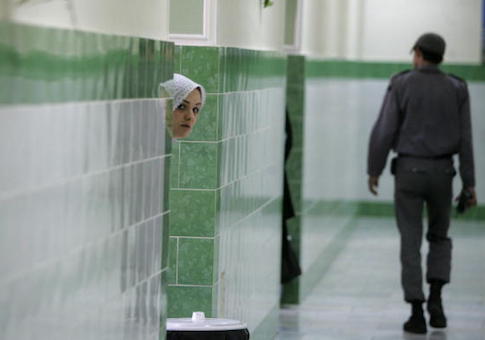The families of four Americans imprisoned in Iran are pleading with officials in Tehran to free their loved ones as the Trump administration steps up its effort to secure their release.
Babak Namazi told reporters Tuesday that time is running out for his 45-year-old brother Siamak Namazi and 81-year old father Baquer because their mental and physical health are deteriorating.
His father, Babak said, has lost 30 pounds during his imprisonment and has complained about headaches, chest pains, and fatigue.
Baquer had undergone triple bypass surgery before his jailing, and his doctor had said he would need a pacemaker at some point. His captors recently hospitalized him twice during his imprisonment at Iran's notorious Evin Prison.
"They actually transferred him out, which raised my fear exponentially every day," Babak said.
"As a son, as a human being, I am fearing the worst," he said, referring to the recent death of Otto Warmbier, a 22-year-old University of Virginia student who died in June after his release from North Korea, where he was held for more than a year.
The mental health of his brother, Siamak Namazi, is getting worse every day, Babak said, noting that Siamak has been held for long periods in solitary confinement and is often under intense pressure and interrogations.
Babak also took issue with an interview Iranian Foreign Affairs Minister Mohammad Javad Zarif gave to CBS news last week in which Zarif claimed that Baquer is not being held "behind bars" but is now "free to leave the country," wrongly suggesting he is now under house arrest.
Babak said they have evidence that Zarif's statement is untrue and that their father remains in Evin prison. He also said the Iranians lured his father to Iran with a promise of visiting Siamak but instead imprisoned him.
Namazi restated the developments during congressional testimony at a Foreign Affairs Committee subcommittee hearing Tuesday.
The hearing also featured testimony from two other sons of Americans imprisoned in Iran.
Doug Levinson, the son of former FBI agent Robert Levinson, the longest-held American prisoner in Iran, expressed his frustration with working with three different presidential administrations over the last 10 years to try to secure his father's release.
"We are hopeful with this new administration, but we've heard these promises before," he said. "We have watched as 10 Americans have been captured and released from Iran … 10 times my father has been left behind."
He encouraged the Trump administration to hold Iran accountable if the government in Tehran does not fulfill recent written promises to help provide more information about Levinson's whereabouts and treatment inside Iran.
"Hold their feet to the fire—do anything—do something," Doug Levinson urged. "…The thought that the U.S. has failed to rescue my father is demoralizing."
Omar Zakka, the youngest son of Nizar Zakka, a telecommunications specialist who was imprisoned in Iran in the fall of 2015 also spoke out on his father's behalf.
Zakka stressed that his father, a Lebanese citizen and U.S. permanent legal resident, was in Iran at the time of his jailing at the invitation of the Iranian government.
He was there to speak at a conference on women and business development, Omar Zakka said.
"He was invited by a government as a guest and gets kidnapped by that same government," Zakka said.
Omar said his father has refused to sign any forced confessions and is in the 30th day of his hunger strike, which is taking a terrible toll on his health.
"My dad said he would rather die than succumb to his captors—that this was about liberty or death," Zakka said, referring to American founding father Patrick Henry's famous line.
"I plead with you, my American people and the people in our homeland of Lebanon, please, don't let my father die in Iran," he said.
The House hearing comes after a week of Trump administration actions against Iran and efforts to free Americans held there.
On Friday President Trump issued a statement, warning that Iran would face "new and serious consequences" unless all unjustly detained Americans were released and returned. He specifically called on Iran to free Levinson, as well as businessman Siamak Namazi and his father Baquer, and took issue with the recent sentencing of Xiyue Wang to 10 years in prison on spying charges.
Xiyue is a 37-year-old Chinese-American who was conducting research in Iran for his Ph.D. at Princeton University.
Trump also sought to remind the Iranian government that the world is watching to see how U.S. citizens with serious health conditions are treated in their prisons.
"Iran is responsible for the care and wellbeing of every United States citizen in its custody," the White House said in the statement.
Secretary of State Rex Tillerson met with Oman's foreign affairs minister on Friday. U.S. officials have a history of seeking Oman's help in helping secure the release of Americans detained overseas. After Omani officials stepped in to help negotiate, U.S. prisoners held captive by Yemeni Houthis were released.
Earlier last week, the Trump administration announced that it had sanctioned 18 entities and individuals connected to Iran's ballistic missile program, military procurement, and the Islamic Revolutionary Guard Corps.
